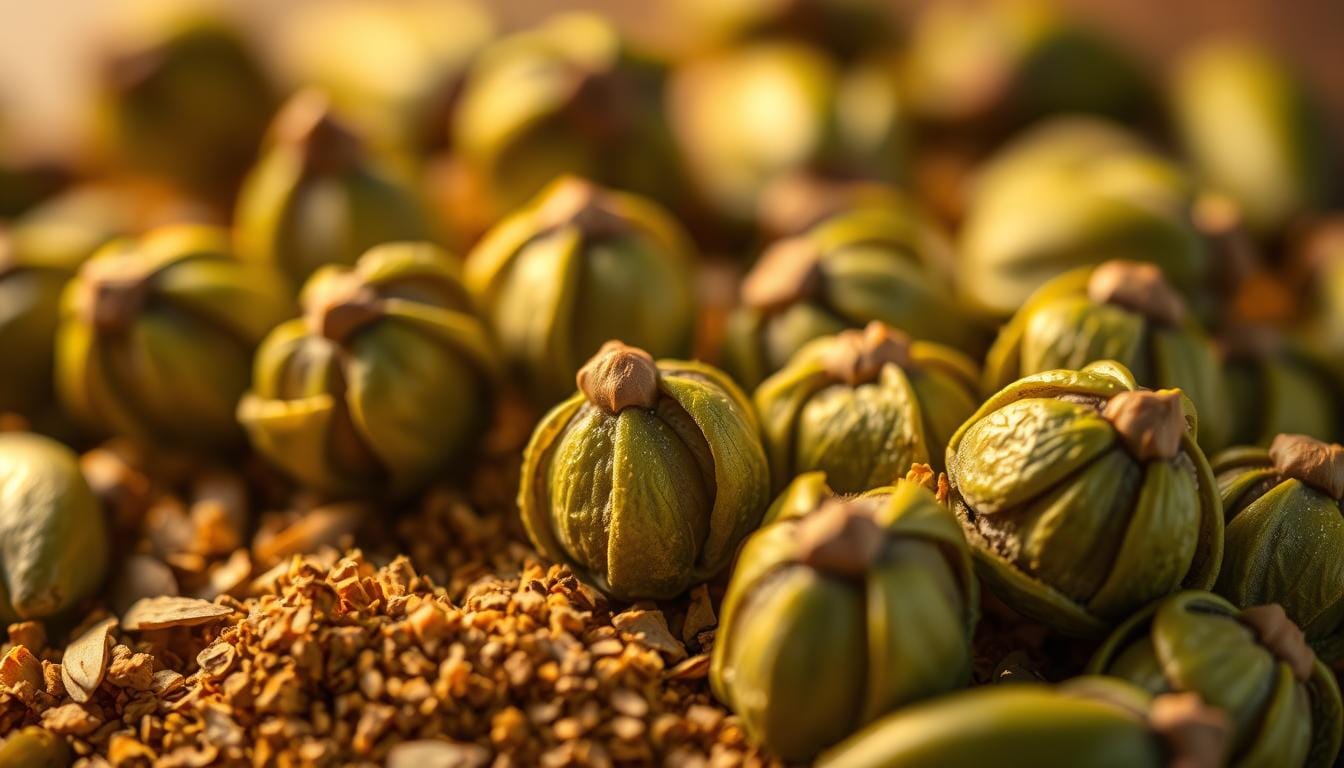Health Benefits of Cardamom: The Aromatic Spice for Dig
Discover the health benefits of cardamom spice, including digestion, breath freshening, and antioxidant properties. Learn how this aromatic spice boosts wellness.
Originating in India, this spice is now loved worldwide. Studies suggest it may help lower blood pressure, fight inflammation, and boost antioxidant levels in the body. Its diuretic and antioxidant properties make it a natural choice for supporting heart and metabolic health.
Whether you’re sprinkling it into your morning coffee or adding it to a curry, cardamom is versatile and easy to use. Its potential to improve oral health and freshen breath is just another reason to keep it in your pantry. Ready to explore how this aromatic spice can enhance your daily life?
Key Takeaways
- Cardamom is a versatile spice with a rich history in cooking and traditional medicine.
- It may help lower blood pressure and support heart health.
- This spice is known for its antioxidant and anti-inflammatory properties.
- It can be used in both sweet and savory dishes for added flavor and health benefits.
- Cardamom is easy to incorporate into everyday meals and beverages.
Introduction to Cardamom: History and Culinary Uses
This ancient spice has a story that spans thousands of years and multiple civilizations. Originating in the lush forests of India, cardamom quickly became a prized commodity. Traders carried it to ancient Egypt, Greece, and Rome, where it was valued for its unique flavor and aromatic properties.
Over time, cardamom spread globally, finding its way into Scandinavian kitchens through Viking and Moorish trade routes. Today, it’s a staple in many cuisines, from Middle Eastern dishes to Scandinavian pastries.

Origins and Global Spread
Cardamom’s journey began in India, where it was used in traditional medicine and cooking. Ancient texts mention its use in rituals and remedies. As trade routes expanded, this spice reached the Mediterranean and beyond. Its popularity in Scandinavia is particularly notable, where it’s a key ingredient in festive breads and desserts.
Culinary Versatility and Traditional Remedies
Cardamom’s versatility shines in both sweet and savory dishes. It adds depth to curries, enhances the flavor of desserts, and even elevates a simple cup of tea. In traditional remedies, it was often used to freshen breath and support oral health.
Today, cardamom is available in various forms, including whole pods, ground spice, and essential oil. Each form offers unique benefits, making it easy to incorporate into your daily routine. Whether you’re cooking a hearty dish or brewing a soothing tea, this spice is a must-have in any kitchen.
Health Benefits of Cardamom Spice
Cardamom isn’t just a flavorful spice—it’s packed with compounds that may transform your well-being. Scientific studies highlight its antioxidant and diuretic effects, which can support overall health. Additionally, preliminary research suggests it may even play a role in reducing inflammation and fighting cancer.

Antioxidant and Diuretic Effects
Cardamom is rich in antioxidants, which help protect your cells from damage caused by free radicals. These compounds can reduce oxidative stress, a key factor in aging and chronic diseases. In one study, participants who consumed cardamom supplements for 12 weeks showed a significant increase in antioxidant levels.
Its diuretic properties also help the body eliminate excess fluids and toxins. This can be particularly beneficial for managing blood pressure. Research on rats found that cardamom supplementation reduced elevated blood pressure, making it a promising natural remedy.
Anti-Cancer and Inflammation Reduction
Emerging studies suggest that cardamom may have anti-cancer properties. Test-tube studies have shown that its compounds can inhibit the growth of certain tumors. While more research is needed, these findings are encouraging.
Cardamom’s anti-inflammatory effects are another key benefit. Chronic inflammation is linked to many diseases, and this spice may help reduce it. Traditional remedies have long used cardamom to balance the body’s natural defenses, and modern science is now validating these claims.
| Study Focus | Findings | Duration |
|---|---|---|
| Antioxidant Levels | Increased antioxidant activity in participants | 12 weeks |
| Blood Pressure | Reduced elevated blood pressure in rats | 8 weeks |
| Tumor Inhibition | Inhibited tumor growth in test-tube studies | N/A |
Digestive Health Wonders with Cardamom
Digestive discomfort? Cardamom might be the natural solution you’ve been looking for. This aromatic spice has been used for centuries to ease stomach issues, from ulcers to general discomfort. Its soothing properties make it a go-to remedy in both traditional and modern practices.
Relief from Ulcers and Stomach Discomfort
Studies show that cardamom extract can reduce the size and number of gastric ulcers. In animal research, it demonstrated the ability to protect the stomach lining. This makes it a promising option for those dealing with ulcer-related pain.
Its natural compounds also help calm inflammation in the digestive tract. This can ease discomfort caused by high-fat meals or other dietary triggers. Adding it to your food is an easy way to enjoy these benefits.
Traditional Digestive Remedies vs. Modern Research
Historically, cardamom was used to freshen breath and settle the stomach. Today, science backs these claims. Research highlights its ability to combat harmful bacteria like Helicobacter pylori, which can cause stomach issues.
Modern studies also confirm its role in improving overall digestive health. Whether you’re brewing tea or adding it to a dish, this spice is a simple yet effective way to support your gut.
Cardamom for Oral, Heart, and Metabolic Health
Cardamom’s benefits extend far beyond its aromatic flavor, offering support for oral, heart, and metabolic wellness. This spice has been a natural remedy for centuries, and modern research continues to uncover its multifaceted advantages.
Fresh Breath and Oral Health Benefits
Cardamom has long been used as a natural breath freshener. Its compounds help neutralize bad breath by disrupting bacteria in the mouth. Studies show it can combat cavity-causing bacteria, reducing the risk of gum disease.
Chewing on a cardamom pod or adding it to tea can keep your breath fresh throughout the day. Its antibacterial properties make it a simple yet effective way to maintain oral hygiene.
Impact on Blood Pressure and Metabolic Syndrome
This spice also supports heart health. Research indicates that cardamom may help regulate blood pressure and cholesterol levels. Its antioxidants improve circulation, reducing strain on the heart.
Initial studies suggest it can benefit metabolic health, too. Overweight individuals who took cardamom supplements showed improved markers of metabolic syndrome. This includes better blood sugar control and reduced inflammation.
Whether you’re looking to freshen your breath or support your body’s systems, this spice is a versatile addition to your daily routine.
Other Notable Health Perks and Usage Considerations
Cardamom offers more than just a burst of flavor—it’s a versatile spice with surprising perks. Whether you’re using it in cooking or as a supplement, understanding its safe usage is key to reaping its full potential.
Supplement Guidelines and Safe Usage
While cardamom is generally safe when used in food, concentrated supplements require caution. Studies suggest a daily dosage of 500 mg is effective, but it’s essential to consult a doctor before starting any new regimen.
Special care is needed for certain groups:
- Children: Avoid giving supplements without medical advice.
- Pregnant or breastfeeding women: Consult a healthcare professional before use.
Research on cardamom supplements is still limited compared to its culinary applications. Always prioritize safety and professional guidance.
Enhancing Flavor While Boosting Health
Cardamom’s ability to elevate dishes without adding calories makes it a kitchen favorite. Its oil and powder forms are popular for both taste and medicinal purposes. For example, adding a pinch to your tea or a curry can enhance flavor while providing antioxidant benefits.
Here’s how to incorporate it into your meals:
- Use cardamom pods in soups or stews for a fragrant twist.
- Add ground cardamom to baked goods or smoothies.
- Infuse cardamom oil into dressings or marinades.
By blending flavor and wellness, this spice is a simple yet powerful addition to your diet.
Conclusion
From ancient remedies to modern science, cardamom continues to prove its worth. This aromatic spice supports digestion, freshens breath, and may even help regulate blood pressure. Its natural compounds combat harmful bacteria, making it a simple yet effective addition to your routine.
Scientific research highlights its antioxidant and anti-inflammatory properties. Whether you’re brewing tea or cooking with cardamom pods, its versatility is unmatched. Adding it to your meals is a safe and flavorful way to enjoy its perks.
Explore the legacy of this spice, from traditional use to modern validation. Start experimenting with cardamom in your kitchen today and discover its potential to enhance your well-being.







